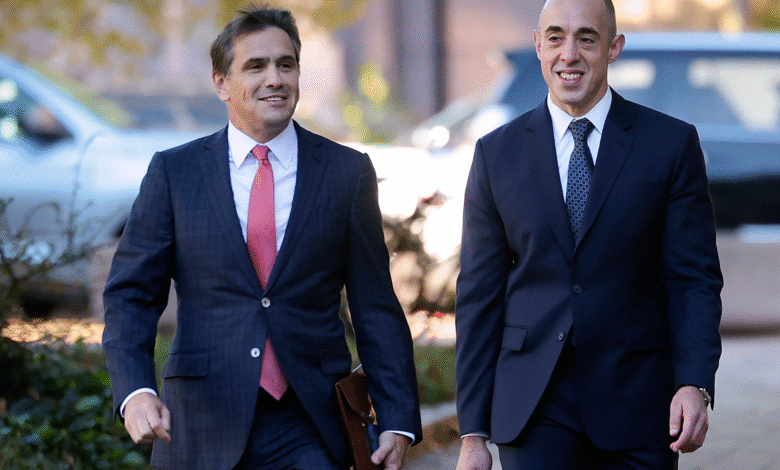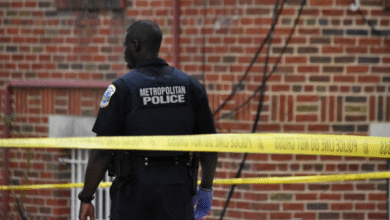Bove Judicial Nominee Controversy: Whistleblower Exposes Claims

The Bove judicial nominee controversy has ignited a fierce debate surrounding President Trump’s selection of Emil Bove for a federal circuit court judge position. Accusations have surfaced, spearheaded by whistleblower claims from former DOJ lawyer Erez Reuveni, suggesting that Bove advised departmental attorneys to disregard court orders related to deportations mandated by the Alien Enemies Act. This revelation raises significant concerns regarding DOJ misconduct allegations and the integrity of judicial nominees under Trump’s administration. As the Senate Judiciary Committee prepares for Bove’s confirmation hearing, key figures like Senator Dick Durbin are vocal about the dangers of appointing someone who may facilitate court order defiance. With these serious allegations at stake, the confirmation process for Emil Bove is poised to become a pivotal moment in discussions about the rule of law and accountability in the justice system.
The controversy surrounding the nomination of Emil Bove to the federal circuit court has uncovered troubling allegations regarding his conduct at the Department of Justice. Accusations of fostering an environment of contempt for judicial authority and encouraging actions that disregard legal orders highlight the contentious nature of Trump’s judicial appointments. Amidst accusations of misconduct within the DOJ, including whistleblower claims from former staff, the scrutiny on Bove’s nomination has intensified. Key lawmakers, notably Senator Durbin, are raising alarms about the potential repercussions of confirming nominees who may undermine judicial integrity. This situation reflects larger issues within the Trump administration regarding the balance of power and adherence to legal frameworks.
The Controversy Surrounding Emil Bove’s Nomination
The nomination of Emil Bove as a federal circuit court judge has sparked a significant controversy, largely due to allegations of misconduct during his tenure at the Department of Justice (DOJ). A prominent whistleblower disclosure has surfaced, accusing Bove of advising colleagues to flout court orders and undermine legal procedures, especially regarding the deportation of immigrants. These revelations raise serious questions about Bove’s respect for judicial authority and adherence to due process, which are foundational principles for any individual in a judicial role.
Senator Dick Durbin has highlighted the potential ramifications of confirming Bove to a lifetime judicial position. He warns that validating Bove’s nomination could set a dangerous precedent, signaling to future administrations that disregarding court orders and the rule of law is permissible. Durbin’s concerns reflect a broader anxiety about the integrity of the judicial system under political pressures, particularly those exerted by the Trump administration and its nominees.
Whistleblower Claims and DOJ Misconduct Allegations
Whistleblower claims, such as those made by former DOJ attorney Erez Reuveni, have underscored issues of misconduct and ethical violations within the Department of Justice under Bove’s influence. Reuveni’s accounts detail an alarming culture where department officials felt compelled to dismiss judicial instructions, with Bove allegedly encouraging such insubordination during internal meetings. This kind of behavior not only jeopardizes the credibility of the DOJ but also raises serious legal and ethical concerns about the actions taken under Trump’s administration.
Further complicating Bove’s confirmation are accusations that he retaliated against attorneys who questioned the administration’s deportation practices. Reuveni’s experiences highlight a troubling atmosphere in which whistleblowers face intimidation for speaking out against unlawful directives. If the Senate proceeds with Bove’s confirmation, it could reinforce a narrative of impunity surrounding judicial nominees linked to Trump’s presidency.
Court Order Defiance and Judicial Implications
The allegations of court order defiance tied to Emil Bove’s actions illustrate a troubling trend in the Trump administration’s approach to immigration law enforcement. Reports indicate that Bove urged attorneys to ignore federal court rulings that aimed to protect immigrants’ rights, contravening legal protocols established to ensure due process. Such instances of defiance not only undermine individual rights but also threaten the integrity of the judicial system, raising critical questions about Bove’s qualifications for a lifetime judicial appointment.
The implications of appointing someone with a record of promoting disregard for court orders could reverberate throughout the federal judiciary. If Bove is confirmed, he may carry this troubling attitude towards the rule of law into his new role, impacting judicial decisions for years to come. This scenario raises concerns not just among lawmakers but also within the public about the future of fair legal representation and adherence to the rule of law in immigration cases.
The Broader Pattern of Judicial Misconduct Under Trump
Emil Bove’s confirmation has ignited a discussion about a broader pattern of judicial misconduct associated with Trump-appointed nominees. The events surrounding Bove are emblematic of a troubling philosophy wherein legal norms and ethical standards are significantly undermined in pursuit of political goals. This pattern has been evident in various cases where nominees have shown a propensity for politicizing the judiciary, often at the cost of justice and fairness.
As concerns about Bove’s nomination unfold, they highlight the critical role the Senate Judiciary Committee must play in vetting nominees thoroughly. Lawmakers need to weigh not just Bove’s qualifications but also the detrimental precedents his confirmation might establish. The scrutiny surrounding this nomination reflects a growing recognition of the vital importance of maintaining an independent judicial system, free from political interference and misconduct.
Impact of Whistleblower Testimonies on Judicial Nominations
Whistleblower testimonies play a pivotal role in shedding light on internal misconduct within government agencies, particularly in discussions surrounding judicial nominations. Erez Reuveni’s accounts regarding Emil Bove provide crucial insights into the alleged ethical breaches within the DOJ, suggesting systemic issues that need to be addressed before confirming individuals to lifetime judicial appointments. These testimonies can often serve as catalysts for a more profound examination of a nominee’s background and alignment with legal principles.
The weight of whistleblower claims can significantly influence public opinion and Senate discussions relating to nominees. In Bove’s case, the assertion that he fostered an environment of intimidation and legal disregard underscores the necessity for thorough investigations. Ensuring that judicial nominees have a demonstrated commitment to the rule of law and ethical standards is essential not only for individual cases but for the integrity of the judiciary as a whole.
Legal Ramifications of Confirming Bove as Judge
The legal ramifications of confirming Emil Bove as a federal judge involve potentially exacerbating existing issues within the judicial system. Given the troubling allegations of misconduct and court order defiance associated with his candidature, appointing Bove could lead to a miscarriage of justice in future cases he oversees. This scenario raises alarms about how such confirmations could affect trust in the judiciary among the public, particularly among communities that feel vulnerable to biased legal interpretations.
Moreover, the confirmation of judicial nominees with potentially compromised ethical standards could undermine the foundation of our legal system. It sends a signal that political loyalty may be prioritized over judicial integrity, thereby risking a judicial landscape marked by partisanship rather than impartiality. The potential long-term implications of Bove’s confirmation necessitate robust debate and careful consideration by lawmakers, reflecting the essential role the judiciary plays in upholding democratic principles.
Senatorial Response to Bove Judicial Nominee Controversy
The senatorial response to the controversy surrounding Bove’s nomination has been one of deep concern and critical evaluation. Prominent senators are advocating for a thorough review of Bove’s record, emphasizing the importance of accountability and ethical standards in judicial appointments. This scrutiny reflects a bipartisan awareness of the significant implications that Bove’s appointment could have on the integrity of the judicial system.
Responses from various lawmakers underscore the need for diligence and reflection, particularly in light of the whistleblower’s claims and the potential consequences of confirming individuals who may not meet the ethical expectations of their future roles. As the Senate deliberates Bove’s nomination, the dialogue highlights essential questions about the balance between political influence and judicial independence, crucial for maintaining a fair and just legal system.
The Role of Public Opinion in Judicial Nominations
Public opinion plays a crucial role in shaping the outcome of judicial nominations, particularly in high-profile cases like that of Emil Bove. As narrative around Bove’s nomination gains traction, public sentiment may sway the decision-making process within the Senate. Concerns stemming from allegations of misconduct and lack of respect for judicial authority are likely to resonate with constituents, prompting lawmakers to consider the broader implications of confirming controversial nominees.
The feedback fueled by public discourse can act as a powerful force, encouraging transparency and accountability among judicial nominees. In Bove’s case, heightened awareness of his alleged misconduct may lead to increased calls for rigorous vetting and accountability, ensuring that only those with proven dedication to fairness and the rule of law ascend to judicial positions. This interplay between public opinion and judicial nominations is fundamental in reinforcing the democratic principles upon which the judicial system is built.
Conclusion: The Stakes in the Bove Confirmation Hearing
The stakes in the confirmation hearing for Emil Bove have profound implications for the judiciary and broader legal landscape in the United States. As the Senate weighs the controversies surrounding his nomination, the considerations must encompass the serious allegations of misconduct, including his disregard for court orders and the insights provided by whistleblower claims. The outcome of this nomination would not only determine Bove’s future but also reflect on the integrity of the judicial system and its ability to operate free from political machinations.
Ultimately, the confirmation of judicial nominees like Bove serves as a crucial litmus test for the commitment of lawmakers to uphold the rule of law and ensure that the judiciary remains a bastion of justice. As the deliberations unfold, the Senate must navigate through the complexities of these allegations to make a decision that will resonate throughout the legal community and among the American public for years to come.
Frequently Asked Questions
What are the allegations surrounding Emil Bove’s confirmation as a judicial nominee?
Emil Bove, nominated by Trump for a federal circuit court judge position, faces serious allegations involving court order defiance. A whistleblower, Erez Reuveni, claims that Bove advised DOJ attorneys to ignore judicial rulings and has created a culture of misconduct within the department.
How have Trump’s judicial nominees, like Emil Bove, influenced perceptions of DOJ misconduct?
Trump’s judicial nominees, including Emil Bove, have fueled concerns about DOJ misconduct. Bove’s nomination is particularly contentious due to allegations of urging attorneys to disregard court orders, which raises issues about the integrity of judicial appointments.
What did the whistleblower claim about Emil Bove and court order defiance?
The whistleblower Erez Reuveni alleged that Emil Bove instructed DOJ attorneys to proceed with deportations despite existing court orders, indicating a significant disregard for judicial authority, which could influence Bove’s confirmation process.
Why are Democrats, particularly Senator Dick Durbin, opposed to Emil Bove’s confirmation?
Senator Dick Durbin and other Democrats oppose Emil Bove’s confirmation due to the serious allegations of misconduct and court order defiance, which they believe could undermine the rule of law if he were to be confirmed as a circuit court judge.
What potential consequences are associated with the Emil Bove confirmation and DOJ misconduct allegations?
The potential consequences of confirming Emil Bove include undermining judicial integrity and the rule of law, particularly given his alleged misconduct in handling court orders, which could erode public trust in the judicial system.
How has the response been from DOJ leadership regarding the allegations against Emil Bove?
DOJ leadership, including Deputy Attorney General Todd Blanche, has dismissed the allegations against Emil Bove as untrue, labeling the whistleblower’s claims as falsehoods from a disgruntled former employee, thereby complicating the confirmation discussions.
What role does the Senate Judiciary Committee play in the Emil Bove confirmation process?
The Senate Judiciary Committee is critical in the Emil Bove confirmation process, as they review his qualifications, consider allegations of misconduct, and ultimately make recommendations to the full Senate regarding his appointment as a federal circuit court judge.
What is the broader significance of the Emil Bove judicial nominee controversy?
The Emil Bove judicial nominee controversy highlights significant issues regarding accountability, due process, and the potential consequences of judicial appointments made during the Trump administration, particularly in light of allegations of DOJ misconduct.
| Key Point | Details |
|---|---|
| Allegation by Whistleblower | Erez Reuveni, a former DOJ lawyer, claims Emil Bove advised to ignore court orders regarding deportations. |
| Senator Durbin’s Opposition | Sen. Durbin cautions against confirming Bove, highlighting potential negative consequences. |
| Claims of Misconduct | The whistleblower’s letter to Congress details misconduct within the DOJ, misleading of courts, and threats against those reporting issues. |
| Trump’s Nomination | Bove has been nominated by Trump for a circuit court judgeship amid these allegations. |
| DOJ’s Response | The DOJ, through Deputy Attorney General Todd Blanche, dismissed Reuveni’s claims as false. |
Summary
The Bove judicial nominee controversy revolves around serious allegations made against Emil Bove, a nominee for a federal circuit court judgeship. Whistleblower Erez Reuveni has accused Bove of endorsing disregard for court orders related to immigrant deportations. This incident highlights significant tensions regarding judicial accountability and integrity within the Trump administration’s DOJ. The Senate Judiciary Committee is faced with the crucial decision of whether to confirm Bove amidst these claims, which point to a broader issue of potential misconduct within the department.



